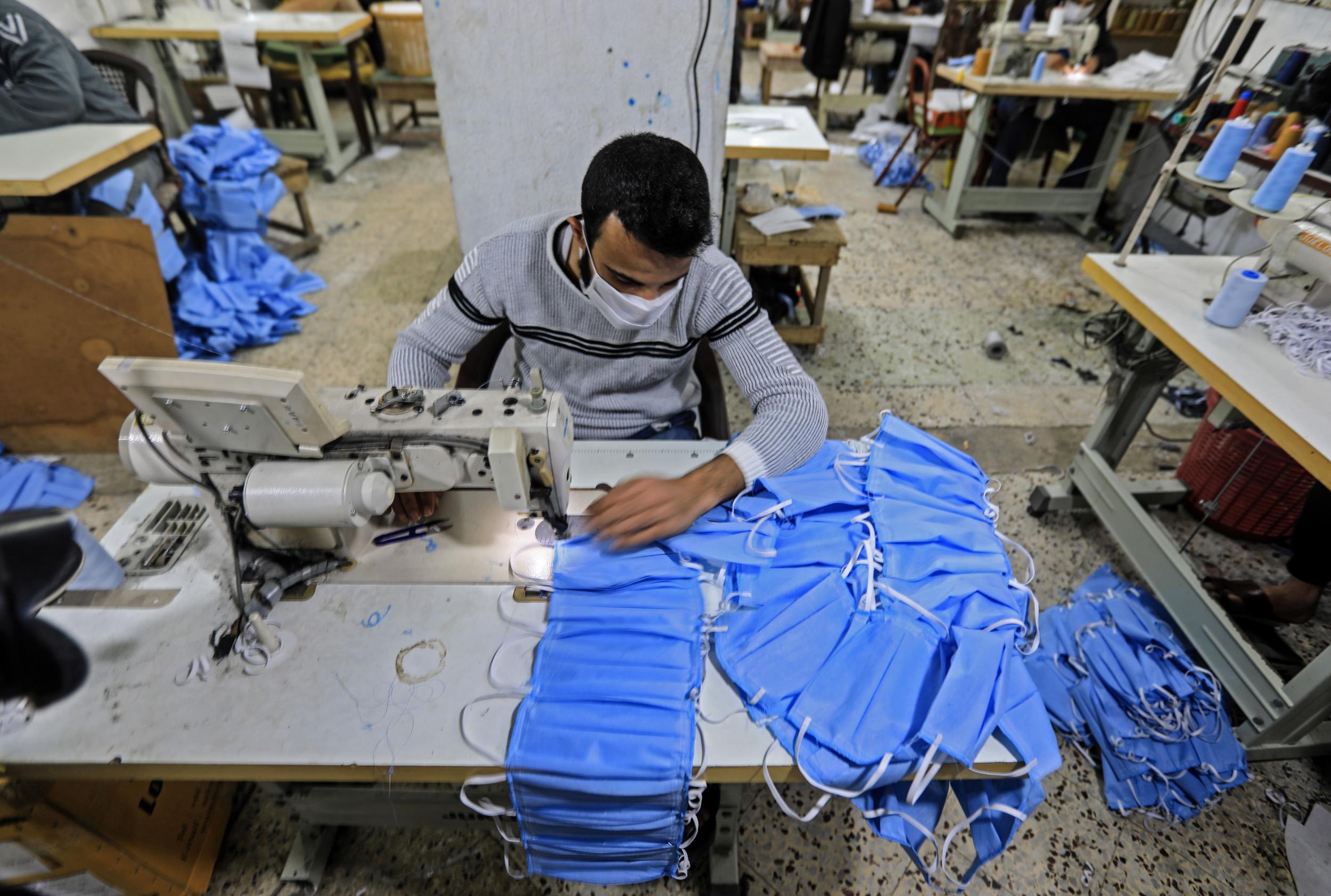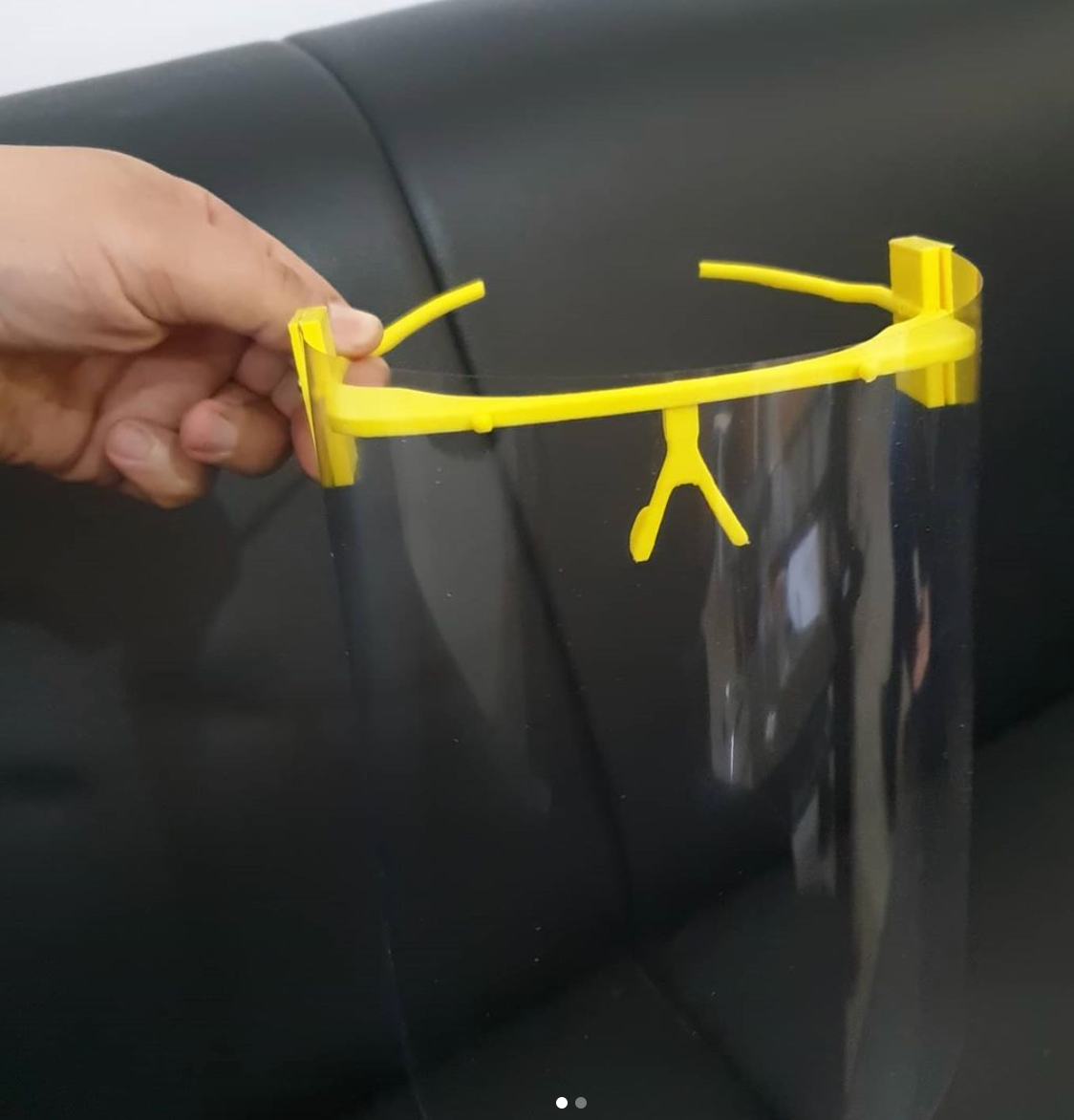With scant supplies, Gaza turns to homemade equipment to battle coronavirus
Palestinians in the blockaded enclave have found creative ways to fight Covid-19 from building makeshift ventilators to 3D-printing face shields

On a battered workbench using makeshift materials, Farouk Sharaf, an electrical engineer in Gaza, puts the finishing touches to his home-made ventilator.
The mechanical device, made of a self-inflating ambu bag valve mask and metal piston, looks disarmingly rudimentary – but it works.
Once it is perfected and tested by health ministry officials, the 36-year-old specialist plans to build at least 100 machines to save lives amid an outbreak of the deadly coronavirus in the besieged Palestinian enclave.
With just one ventilator for every 30,000 people and a healthcare system already on its knees, Gaza’s two million residents are among the most vulnerable to the spread of the deadly virus.
Corralled into a 25-mile sliver of land that has been crippled by a 13-year Israeli and Egyptian blockade, Gaza was already missing key supplies needed to fight the disease before the global pandemic.
Israel has restricted the flow of certain items fearing they will be used as weapons by the militant group Hamas, which runs the strip.
Nearly half of the essential drug list is missing, including saline solution and drugs to treat cancer. There are only around 65 ventilators and a limited stock of personal protective equipment (PPE). The health ministry told The Independent at the start of the outbreak it has just a week’s supply of items like gowns and masks at any time.
And so when the pandemic reached Gaza’s shores mid-March there was a flurry of initiatives to plug the shortfalls, from tech start-ups 3D-printing face shields to creative students fermenting glucose to make hand sanitisers. Textile factories in the Strip have also joined in the effort.
“There is a massive shortage of equipment in Gaza, and even if we had the funds, there is a global shortage of things like ventilators,” Farouk tells The Independent. “So we knew we had to try to make them ourselves.”
Unable to manufacture intensive care unit (ICU) grade ventilators in Gaza, they have taken the idea of a manual resuscitator, the ambu bag used by paramedics in ambulances, and made it automatic.
“Hopefully, if we get a few additional parts, like a sensor, it will be fully digitalised,” he says, adding that they needed of $2,000 (£1,600) to purchase the gear.
Gaza’s battered health ministry and the World Health Organisation have set up quarantine facilities near the border with Egypt and in buildings like schools and even hotels, as well as Covid-19 wards in hospitals to catch any new cases and stem the spread.
So far the plan is working: there have only been 15 confirmed instances of people infected with Covid-19.
But self-isolation is impossible in crowded refugee camps and impoverished neighbourhoods.
And so health ministry officials warn that if they miss just one case, it will be impossible to control a devastating epidemic.
Across town, Sabah Abu Sharikh, 38, a pharmaceutical graduate and mother of four, is among seven students from Gaza’s Islamic University, who are manufacturing disinfectant lotions and sprays.
Using simple lab equipment, the volunteer team is fermenting glucose to make 20-litre batches of 70 per cent ethanol, the raw ingredient of hand sanitisers.
She said they are currently conducting lab tests to standardise the product and make it widely available to the public.
“We gave our existing batches to people who cannot afford to buy hand sanitisers or disinfectant and it’s been really successful,” she tells The Independent over the phone.
“We are in the process of improving the properties of the product, so we can distribute to hospitals as well,” she adds.
“Everyone is encouraging us because this is key to protecting vulnerable families.”
A lack of surgical masks and medical gowns has also sparked other initiatives in Gaza’s bustling main city.
Basharl al-Boweb, the owner of the clothes factory Unipal, said he now employs 400 workers in two daily shifts to make PPE.
They manufacture thousands of masks and hundreds of gowns a day that have been certified for use by the health ministries of both Gaza and Israel, which is purchasing some of the wares.
“We have been making clothes since 1942 but wanted to help when coronavirus hit and so made the shift,” he tells The Independent.
The owner of a 3D printing start-up, meanwhile, says he is creating face masks and spare parts for the CPAP oxygen hoods that encase Covid-19 patients’ heads to help them breathe.

Mohammed Abu Matar, 33, a telecommunications graduate who used to make and repair office printers, first launched his startup Tashkeel3D five years ago, becoming one of the first companies to bring 3D printers into Gaza.
They now make an eclectic mix of objects, from models of violins to tourniquets.
With the arrival of coronavirus, he found a design for a 3D-printed face shield on an open-source design platform. When he posted the result on Instagram, dozens of customers reached out to place orders.
The shields cost just $5 and can be used repeatedly.
“I was so worried about people in Gaza, given an epidemic here would be catastrophic, I searched for ideas online,” he says.
“Officials in the Ministry of Health saw my masks and connected me to other engineers to manufacture more important items like the values and connectors for the CPAP hoods.”
I firmly believe in harnessing technology to improve people’s lives even with the simplest resources
His face shields have been used by medical personnel such as dentists and hospital orderlies. He is working with the government to create more equipment spare parts which are missing.
“Here in Gaza, we live in a humanitarian disaster all the time,” he says, sharing photos of the masks.
“I firmly believe in harnessing technology to improve people’s lives even with the simplest resources.”
Join our commenting forum
Join thought-provoking conversations, follow other Independent readers and see their replies
Comments